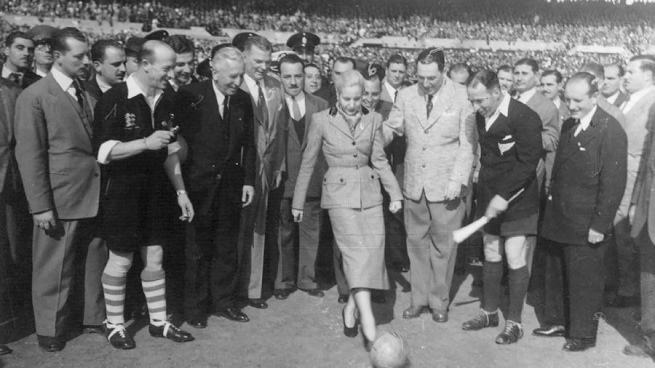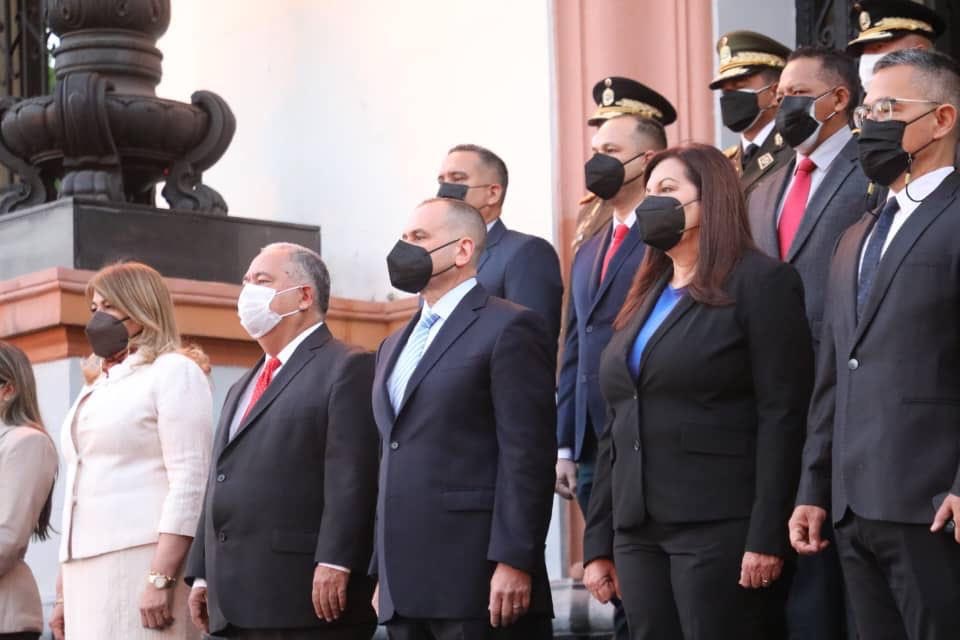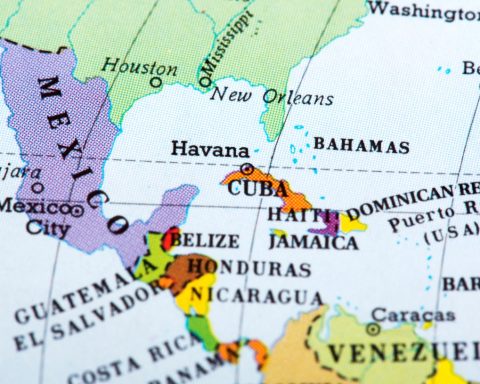Eva María Duarte de Perón left an immeasurable legacy in different areas of Argentine society with her direct participation in the protection of the humble overwhelmed by the powerful and football was not exempt from it when in the definition of the 1951 first division championship she supported decidedly the modest Banfield against the opulent Racing Club.
Evita’s intervention in that final between the two teams from Greater Buenos Aires was direct, to the point that the president himself, her husband Juan Domingo Perón, backed, albeit reluctantly, her idea that a Banfield win was going to have a significant effect on the upcoming elections, because it would mean that the poor could also succeed and that this was not just a privilege of the rich.
And that image of supreme power in football was represented at the dawn of the 50s precisely by Racing, who had won the title that year and also the previous one, so they reached the defining heads-up match against Banfield in the search of the triple championship.
But that hegemony was not well seen from the Casa Rosada, beyond the fact that soccer was not a topic that sat at the table of Perón and Eva, because the fans of all the other clubs, except obviously those of Racing, saw this as “the government team”.
And the reason to believe in that popular legend had a key actor: Ramón Cereijo, the Minister of Finance at the time, who had a decisive link and impact on the sporting life of “La Academia”to the point that Racing was known in the football and media environment as “Sportivo Cereijo”.
This, of course, greatly displeased Evita, because it inevitably associated Peronism with the ruling classes, and soccer being such a popular sport, that the humble Banfield, baptized “El Drill” because he “drilled” his rivals, won the overwhelming albiceleste multi-champion, not only took off the Government of that supreme team but also gave place to the one that came from below.
Of course, Perón preferred that Racing be the champion, although not because he was a fan, since he sympathized with Boca Juniors, but precisely because of his affection for Cereijo, who was the executing arm of the so-called Five-Year Plan as well as the nationalization of the railways.
And for this reason, Perón had arranged for Racing to be granted low-rate loans to build its imposing cement stadium, which, in return, had it baptized precisely with his name. But that symbiosis between politics and sports, or vice versa, ended up “confronting” him with his wife, although he accepted that for the image of his Government the title of Banfield suited him better.
The issue was that Banfield reached the end of the championship in first place due to goal difference (30 to 23) over Racing, both with the same number of points (44), but what the title would have meant for “El Drill”, the first of a team of the so-called “boys” in twenty years of professionalism, was prevented by a change in the regulations registered shortly before the end of the contest.
The resolution to define the champion “with a playoff match, on a neutral field, in case of equality of points”, dismantled, in the broad sense of the word, what was originally contemplated on the credit for the one with the best goal difference in case that parity instance is generated.
The fight between the small and the great, the humble and the opulent, the poor and the rich, was then raised and generated a popular upheaval that could not go unnoticed to the highest national authorities.
It was the desire and support of all the fans so that the albiverde team would be the champion that put an end to the racinguista hegemony once and for all after two consecutive titles, something that Evita corroborated when consulting the popular sports reporter Enzo Ardigó for so much popular effervescence : “Which of the two teams is the humbler?” The answer was Banfield. “Then I want him to be champion,” he urged..
That reconstructed dialogue and the confirmation by an important Peronist reference such as Antonio Cafiero in the documentary “Evita capitana” about how well the Government saw Banfield as champion, later gave room for all kinds of speculation, with perks of luxury cars for both teams, but not exactly to win.
And Racing, in the face of Evita’s already explicit support for Banfield, then reached that final badly standing before public opinion, to the point that the starting goalkeeper Antonio Rodríguez, a fervent admirer of the “flag-bearer of the humble”, preferred not to play that final and gave his place to Héctor Grisetti.
However, the suspense of that definition was going to prolong the popular expectation as if it were a true period movie, since the game played on December 1, 1951 on the San Lorenzo stadium ended in a goalless draw, so there was a second confrontation four days later on the same stage as Racing finally ended up winning with a great goal from “Atomico” Mario Boyé at the minute of the second half.
Cereijo rewarded each racinguista player with 20,000 pesos for having obtained his third consecutive championship and his immediate subsequent action by the Government was to pay off the country’s foreign debt. But two months later, in February 1952, he was removed from his post. Evita died on July 26 of that year.
History burned into a definition of the press to define Banfield, which was the one with which he baptized the visiting grandstand of his Peña and Arenales stadium: “Moral Champion 1951”. A consolation prize with the aroma of vindication for a humble man who dared to challenge a powerful man and was about to dethrone him, although he did not succeed. Just in another December, already in 2009, he would achieve his first and only title in the first division.
“We felt the support of Evita and it was a shame to lose that final because we had a great team, but Racing was too”recognized this chronicler Luis Bagnato, Banfield’s central defender in those finals.
And it reminded him of a significant fact of that definition that also marked a reference of the time in terms of the splendor and care that the Peronist government gave to sport (the Evita Games were promoted by its Foundation): the referee of the defining match was Bert Cross, one of the many Englishmen who had brought the AFA from Great Britain in 1948 due to the extremely poor level of the Argentine referee.


















